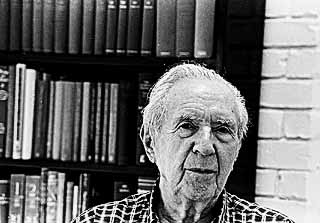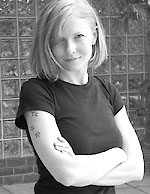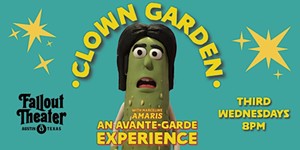The Man Who Knew Too Much
Jacques Barzun, Idea Man
By Roger Gathman, Fri., Oct. 13, 2000

Jacques Barzun's book, From Dawn to Decadence: 500 Years of Western Cultural Life: 1500 to the Present (HarperCollins, $36), has achieved news status by the traditional route of inverting expectations -- as in the old "man bites dog" cliché -- by being at once an 877-page chunk of intellectual history and a bestseller. The book isn't inspirational, nor penned by a newscaster celebrity, nor does it reveal startling sexual peculiarities of dead or living celebrities. Instead, Barzun has presumed that the play of the mind is itself a pleasure. Who would dream that out there in the hinterlands beyond Peoria, people would read a book that contains, among other things, an elegantly written mini-essay about Georg Lichtenberg, the 18th-century German aphorist? Try selling that in Hollywood.
And yet ... Barzun has done it, which is why he is being interviewed all over the media. The story, admittedly, is irresistible: This magisterial summing-up of Western culture has been cast upon the world by a 93-year-old man. You have to go back to Sir Kenneth Clark's Civilization, from 1970, to find any bestselling parallel to a book with a sweep this broad, and a style this idiosyncratically elegant, but Clark's book had the advantage of being backed up by a PBS miniseries. The news instinct is that Barzun's popularity is a sign of the times, and it is easy to see the hook here: Little Big Man as a New York intellectual, emerging out of the group amnesia to which we usually consign our history to speak in the cultured accents of a long lost level of civilization.
I'm a sucker for that hook. Barzun's life has, indeed, been a happy, prolonged immersion in a pretty high level of civilization, starting with the circumstance of his birth. His father was a prominent author in that fin-de-siècle France best described by Proust's In Seach of Lost Time. As a mere infant, he met his father's friends, Modernist icons like Apollinaire and Duchamp. After finishing his schooling at the lyceé, Barzun, on his father's advice, came to the United States. This was a rather adventurous move: As Barzun puts it, "I more or less expected to see Indians and cowboys riding down Broadway." Graduating from Columbia University, he stayed on there, as a professor of cultural history, from 1927 to 1975. Although he was of retirement age, he began a second career by becoming an editorial consultant at Scribners for over a decade. During his tenure at Columbia, Barzun was pretty much at the heart of the New York intellectual scene. He taught a famous "Great Books" class there with Lionel Trilling. Although some critics have assumed, from Barzun's criticisms of modern culture, that he is a conservative ideologue, in reality, he has always followed his own pragmatic vision of things. His first book, Race: A Study in Superstition (1938), predates Stephen Gould's classic book on the subject, The Mismeasure of Man, by almost 40 years, debunking what was at that time the central tenet of conservativism, the myth of the superior race. Since then, Barzun has produced a steady stream of books and articles, for both the popular press and scholarly journals. He's written the standard text on research methodology in the humanities, and he's edited detective anthologies. His book Marx, Darwin, Wagner was, briefly, a bestseller in the Forties. Another book, which opened fire on the conventional wisdom about progressive education, House of Intellect, was a bestseller in the Fifties. My favorite among his books is the essay collection The Energies of Art (1956), which is rather like an introduction to both From Dawn to Decadence's emphasized figures and its pessimistic coda.
Austin Chronicle: In the preface to your book, The Energies of Art, you talk about growing up in the midst of a pretty seriously cultured family in the years before World War I.
Jacques Barzun: My father was a writer and aesthetician -- a writer of novels and poetry -- at the same time he was a civil servant in the Ministry of Labor. He wrote widely and had a wide circle of friends. One Saturday a month, it was open house for all these characters who were laying the foundation for modern art. Appollinaire, Duchamp, Duchamp-Villon. Ezra Pound came. André Gide, who was a member of the older generation. There was a number of older people who came to see what the young wild boys were about to do. I was an only child, and one brought up under modern ideas of participation in life, and not segregation to the back bedroom.
AC: An exciting time to be a child.
JB: There was this new surge of creation, inventiveness, new techniques, which gave promise that the 20th century would be one of the great productive periods of Western culture. It all collapsed into the tensions of the First World War. There were hundreds of thousands of gifted people killed. They were part of a break; they made a chasm. The generation that came to literary and other activities in the Twenties were very young men who did not have their elders' guidance and lacked a sense of resistance to their elders, both of which are necessary to true literary creation.
AC: How did you come to America?
JB: During the war, my father was pulled out of the trenches to go on a diplomatic journey to America. When he got back he said to me, "Do you want to go to Oxford, or to the leading American university, Columbia?" So I, who had read James Fenimore Cooper and all sorts of books about the Indians, of course, I opted for Columbia.
AC: You started teaching with Lionel Trilling in the Thirties. That was when there was a lot of radicalism in the New York scene, as with the Partisan Review crowd.
JB: I had no Marxist coloring, such as they had. Most of them repudiated the Soviet Union, but I was not at all in that stream of tendencies. I stood aloof, although not hostile, and I take it they weren't hostile to me. They deplored my blindness.
AC: Still, your first book could be called "engaged," since you took on the topic of race. And to call it a "superstition" was pretty bold.
JB: I did my dissertation on the supposed identity of the "French race." The nobility said they were the German conquerors of the Gallo-Romans. The German conquerors were noble, blue-eyed, blond-haired, wonderful characters. And the right of conquest was established as the sign of superiority. That was upset in 1788 when the Abbé Sieyes wrote a little pamphlet -- "Well, if the right of conquest establishes superiority, we the bourgeouisie are going to conquer the nobility and so we'll be superior." So the question of who was the French race, I conclude that the French are a hopeless mixture of not only Romans, but Iberians, Syrians, Phoenicians.
AC: You were also writing about detective stories. That was a divergence of interests.

JB: In France, I read translations of Conan Doyle, and a large number of what you call roman policiere, which in those days were rife, like Gaston LeRoux. When I came here, one of the first things I used my English on was Conan Doyle, and all the writing that women were doing, beginning with Dorothy Sayers. I read Black Mask, but I didn't like the pulps. I liked the highbrow stuff. Then Dashiell Hammett gave hardboiled literary quality, and then I began to read it. Raymond Chandler in particular, who I think is superior to Hammett. In my college years, I wrote a whole lot of short crime fiction which I placed in all sorts of little magazines which no longer exist, under a pseudonym.
AC: You started writing about Romanticism when that was not very popular. It's funny, you were aloof from Marxism, but also from the reaction to it, which was influenced so much by T.S. Eliot.
JB: Yes, I was always against the current. Eliot of course got it from Babbit, who got it from the French eminences of anti-Romanticism. What I read about Romanticism didn't agree with what was said about it. Everything in the books was contrary to fact and legitimate conclusions of fact. Including all sorts of fabrications, simply lies that had gotten into the critical stream and were reproduced over and over again without being checked.
AC: You seem temperamentally more comfortable being at the limit of the Zeitgeist than being in the center of things.
JB: Well, I would call that the historian's detachment.
AC: But Trilling wanted to be at the center of things.
JB: Oh yes, he did. We talked a great deal about it. After about 1935, when we became friends, because when we were undergraduates together, we hardly knew each other. But after a year of teaching together, Marx and Freud and Edmund Burke and so forth, we came to trust each other, and from then on until his death we read each other's manuscripts before publication.
I was perfectly happy to be a teacher, but I wanted to be a writer, too, and I think that was Lionel's feeling also. The ground was prepared for us by a shift in the attitude towards scholarship in the generation that preceded me. I think I did more articles for learned journals than Lionel did. I wrote for the Journal of Ideas, and other journals, where the straight scholarship has no appeal to the public interest. His productions were scholarly in quality, but not in what you might call appearance.
AC:In the Fifties, the Trillings became literary stars. Were you more friends with Lionel professionally?
JB: Oh, we were on social terms. I think that is clear in Diana's book about their marriage (The Beginning of the Journey: The Marriage of Diana and Lionel Trilling). In several instances, I think she is very unjust to Lionel.
AC: She had a reputation as a sharp-tongued woman.
JB: She became so, more and more. When I first knew her right after her great psychological depression, I think I was the first stranger that Lionel took a chance to introduce to her. So I knew her from the beginning. And they had a child. I was ahead of them in that respect, and I would answer questions and give advice about how to bring up Jim.
AC: Since you were in Columbia in the Fifties, you were also at the center of the Beats, since they all went there.
JB: Allen Ginsberg was a student of Lionel's, and of mine, not in our joint course, but separately. But we joined together to save him from the penalties of the law, because he was involved in a very bad affair with an older man who seduced him sexually and used him to help dispose of the corpse of a man that this fellow had killed. Poor Allen, aged 17 or 18, helped to dump this body into the Hudson River. Well, was he in trouble there! With the help of the dean of the college, who also knew Allen, the dean, Lionel, and I waited on the district attorney who fortunately was a Columbia graduate and we said, "This youth is really innocent, although he committed an awful blunder and he's also very gifted in the English Department." We didn't say he was a poet or that might have queered his chances! And that it would be a catastrophe to turn him over to a criminal court and put him in jail. We had to go again to a judge in Brooklyn, I think, because Allen came from Brooklyn or something. Anyway, the district attorney wasn't enough, so we went to a second hearing, which was much more sticky. But Allen was let off.
AC: You knew he was a poet even back then.

JB: Oh yes. He showed me his writing. He'd send me things.
AC: Did he send you "Howl"?
JB: No, I don't think he did. He sent me a letter from India, where I think he got a fellowship to spend a year or so. He sent me a letter that read, I've just met a wonderful guru who can read minds. "I want you to" -- Allen had a way of saying "I want you to do this, I want you to do that" -- "I want you to get him a position in the Philosophy Department." I wrote back, "Dear Allen, the members of the Philosophy Department want nothing so little as to have their minds read."
AC: Compared to New York, San Antonio must be a little, at least intellectually, slow.
JB: Well you see, I've come here for 10 years, lecturing at five or six of the 12 colleges and universities in this town, meeting faculty people, and the fact that also there is a first-rate symphony orchestra under a brilliant conductor who is going to be heard from. And the friends that my wife had made here, because she was a resident before our marriage, and a faculty member of Trinity University, means that we are very well-provided with friends and intellectual conversation. So I miss my New York friends, but I am certainly not deprived.
AC: So as a historian, the mixed nature of San Antonio, both Mexican and Anglo Texas, must fascinate you.
JB: I like the effect a strong Catholic community has on thought and feeling, and public occasions.
AC: Tell me about writing From Dawn to Decadence.
JB: I began thinking about this monster around about 1935. And I started it after retiring from Scribners. As usual I made a lot of plans, about scope, organization, features, what to put in, what to leave out, but not with the idea that once I had decided on a plan, I would follow it to the last detail. I left myself flexibility. I spent about three years on that, including the ordering of the notes and books which I'd been accumulating from 1929. I still have all of those notes from graduate school. Then after two years of mulling, I began to write. In the middle of that, my physical well-being called for a move. My wife is from San Antonio, we'd been coming here for spring break. She has a daughter here and two sons.
Anyway, that was quite an upheaval. First I had to sort out and give away things I had accumulated in 35 years, including 2,700 books that I gave to Columbia University. I kept about 2,500. But they got badly mixed up, they were put in boxes and all that sort of thing. So it took me several months here to recover momentum. And besides that, moving affected me physically, so for a time I was not in a bad way, but a very disturbing way. I had four physicians trying to put me back on track. During that period, I didn't know whether I would live to finish the work. So I took a little time off to write a sort of summary in 40 or 50 pages, which happily proved to be unnecessary. I finished, and had the good fortune to get it accepted at once, with a very large advance, from my old editor at Harpers, to whom I'd been talking about my book for 15 years. My troubles weren't over, because I was required to turn in a disc. As you've seen the book, well, it has certain features that are unusual. The software used to translate the disc into typeset upset instead of setting. It was heartbreaking. There were paragraphs missing, lines transposed -- utter chaos. So, with the help of a wonderful copy editor, Treva Kelley, who was the first really good one, I managed to reconstruct what I had written.
AC: In your first book, you have a quote from Coleridge. Let me read it to you: "An author has three points to settle: to what sort his work belongs, to what description of readers it is intended, and the particular end or object that it is to answer." So let's end this interview with these questions as they apply to From Dawn to Decadence. What sort of work is it?
JB: It is a history, a plain cultural history, with no special theory or gimmickry about it. When I was just beginning to teach at Columbia, after my dissertation, I thought I would write a history of European culture from 1789 to the present. I was dissuaded from it by a friend of my father's who was the director of the Bibliotheque Nationale. I was doing research there and he asked me what I was doing, and I told him, and he said, "Oh, young man, please don't do any such thing. You'll write about things that you know at first hand, and you will fill the rest out with things you get out of secondary texts. There's no need of that at any time." So I said, "How long should I study original works before I begin?" He said, "Well, why don't you wait until you are 80." I think I waited until I was 84, 85.
AC: You seem to be the kind of historian who tries to figure out why things emerge from the succession of facts. Your history seems very personal.
JB: Yes, and I think all great histories do. I've been reading Gibbon since I finished the book, and I've been struck by how much he is in there, calling the tune, giving prizes and bad marks. I was saturated with all those historians long before I began this book. Macauley, Ranke, Burkhardt, and Gibbon, and I thought, "I want to write that kind of book." In fact, all my recent books all follow the same pattern description with pointers.
AC: Second question: What description of readers is it intended for?
JB: If you will notice the dedication, which I took a great deal of thought about, "to all whom it may concern" means all you people who like to read history of the kind that is, perhaps, highly indicative, but not propaganda -- you are the kind of person I'm writing for. It is very hard these days to know who is reading you. It is my impression that anybody whose education has, so to speak, "taken" -- like a vaccination -- can read this book without great strain. Some people have expressed surprise that they can read it, being a little afraid of it at first, as it were, wanting to put their foot in the cold ocean. Now the third part of the question.
AC: What is the particular end or object? This goes to the question of decadence, which is one of the most discussed parts of the book. Some people say you are unappreciative of the 20th century.
JB: The object is really wrapped up in the answer to the first question. I wanted people who had been seduced away from our heritage by all sorts of words like "modernism" and "postmodernism," and "the end of the European age," to come back to what has made us what we are, with the sense of not only continuity, but continuous change, and then to view the state to which those changes have brought us. It isn't to prove that Western civilization is a perfect creation -- it wasn't to prove anything. ![]()








